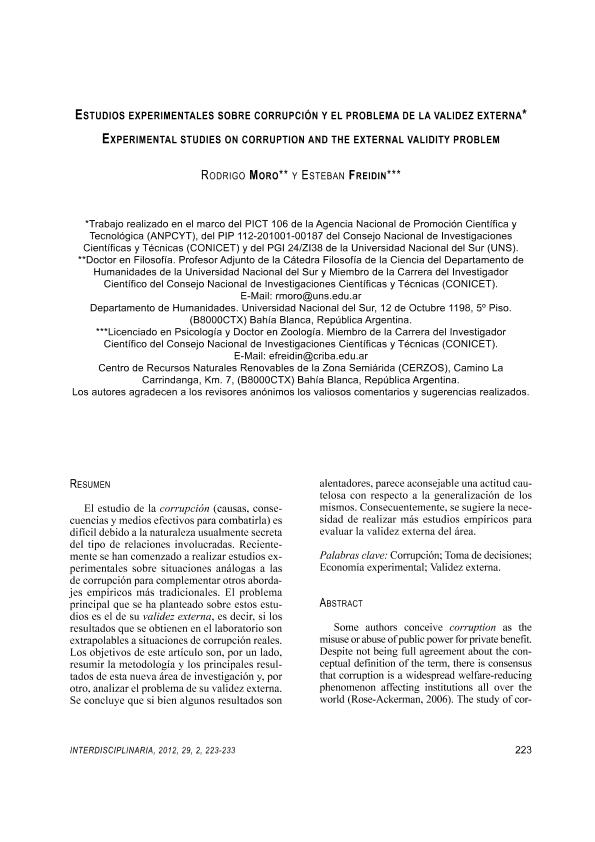Artículo
El estudio de la corrupción (causas, consecuencias y medios efectivos para combatirla) es difícil debido a la naturaleza usualmente secreta del tipo de relaciones involucradas. Recientemente se han comenzado a realizar estudios experimentales sobre situaciones análogas a las de corrupción para complementar otros abordajes empíricos más tradicionales. El problema principal que se ha planteado sobre estos estudios es el de su validez externa, es decir, si los resultados que se obtienen en el laboratorio son extrapolables a situaciones de corrupción reales. Los objetivos de este artículo son, por un lado, resumir la metodología y principales resultados de esta nueva área de investigación y, por otro, analizar el problema de su validez externa. Concluiremos que si bien algunos resultados son alentadores, parece aconsejable una actitud cautelosa con respecto a la generalización de resultados. Consecuentemente, se sugiere la necesidad de realizar más estudios empíricos para evaluar la validez externa del área. Some authors conceive corruption as the misuse or abuse of public power for private benefit. Despite not being full agreement about the conceptual definition of the term, there is consensus that corruption is a widespread welfare-reducing phenomenon affecting institutions all over the world (Rose-Ackerman, 2006). The study of corruption (causes, consequences, and effective means of deterrence) is difficult because of the usually secret nature of the relationships involved. Despite the progress made in cross-country econometric analysis of corruption, on the level of the determinants of behaviour there is still lack of reliable knowledge about the factors that affect people's corruptibility or the institutional features that affect the incidence of corruption (Abbink, 2006). The new field of experimental studies of corruption has recently emerged in an attempt to complement more traditional studies of corruption. In this paper, we first present a brief review of some of the most significant studies in this nascent area, in especial, we focus on introducing the methodology and main results of bribery experiments. In effect, although corruption is a phenomenon that can come in a variety of forms, the offer and acceptance of bribes has been the main focus of interest of this new experimental area. One of the simples ways in which bribery has been modeled in an experiment has been allowing couples of participants to play a Trust Game that can have negative consequences on the other couples (or on passive third parties, depending on the experiment; Abbink et al., 2002; Barr & Serra, 2009; Cameron et al., 2009). Negative externalities happen when the monetary transfer from the first to the second player (the bribe) is reciprocated by the second player choosing an option that favors the first player but harms others. Researchers have also experimentally implemented the possibility of a monetary punishment when the second player chooses the option with negative externalities (Abbink et al., 2002; Cameron et al., 2009). There are two goals that this new area of research pursues. First, researchers try to find out the micro-determinants of corrupt behavior. Second, researchers try to test the efficacy of different anticorruption policies. One of the main problems with experimental studies of corruption is their external validity, that is, the extent to which experimental results can be extrapolated to understand and combat corruption in real life. The second goal of this article is to discuss the external validity issue in experimental studies of corruption from particular examples from bribery studies. We mention two relevant aspects to assess the external validity of studies: on one hand, generalization among different populations, in which the idea is to evaluate the extent to which the same results persist when populations differ between experiments; on the other hand, situational generalization, in which the idea is to evaluate if results persist when the situation or the context varies. It has been argued (e.g., Levit & List, 2007) that the artificial features of the experimental setup (such as the use of abstract language, the detailed characterization of the corrupt transaction and the scrutiny of participants' actions by researchers) make the extrapolation inference very problematic. We conclude that, although some results seem promissory (especially, very similar findings between laboratory and field experiments; Armantier & Boly, 2011), it seems recommendable to keep a cautious attitude toward the generalization of laboratory findings because there is not enough data on this field yet. Consequently, we stress that the problem of generalization can be approached empirically, and that it is necessary to have more studies which aim at evaluating the external validity of experiments in an area which pretends to be relevant to applied issues.
Estudios experimentales sobre corrupción y el problema de la validez externa
Título:
Experimental Studies On Corruption And The External Validity Problem
Fecha de publicación:
12/2012
Editorial:
Centro Interamericano de Investigaciones Psicológicas y Ciencias Afines
Revista:
Interdisciplinaria
ISSN:
1668-7027
Idioma:
Español
Tipo de recurso:
Artículo publicado
Clasificación temática:
Resumen
Palabras clave:
Corrupción
,
Toma de Decisiones
,
Economía Experimental
,
Validez Externa
Archivos asociados
Licencia
Identificadores
Colecciones
Articulos(CCT - BAHIA BLANCA)
Articulos de CTRO.CIENTIFICO TECNOL.CONICET - BAHIA BLANCA
Articulos de CTRO.CIENTIFICO TECNOL.CONICET - BAHIA BLANCA
Citación
Moro, Rodrigo; Freidin, Esteban; Estudios experimentales sobre corrupción y el problema de la validez externa; Centro Interamericano de Investigaciones Psicológicas y Ciencias Afines; Interdisciplinaria; 29; 2; 12-2012; 223-233
Compartir




